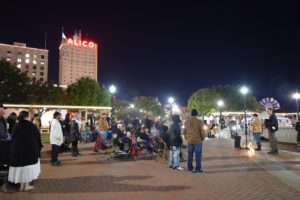by Jenuine Poetess
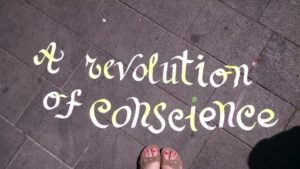
(photo curtesy: JenuineArtworks. Salerno, Italy :: 100Thousand Artists for Change Global Conference, June 2015)
One of the oldest motivations of creativity is as a response to political circumstances and social justice issues. It is not the only inspiration, by any means, and not all artists engage their discipline in this way. Within the context of the mission and vision of Act Locally Waco the Arts & Culture blog seeks to present artists, events, and organizations which are practicing the intersectionality of creative expression, meaningful message, and local action.
On December 4, 2015, over 65 people showed up to offer poems, prayers, statements, songs, sacred texts, and calls to action. Waco gathered in response to global and domestic terrorism and violence; speaking out against hate, racism, discrimination of every kind, ignorance, and intolerance — with the intention of co-authoring an alternative narrative to our current dire situation.
That evening, our community co-created an exquisite artwork with Hopi prayers and Gospel songs, Athiest Holiday carols and passages of the Qur’an, original poetry and Bible verses, impromptu words from the heart and spoken-words of others not with us. One thing brought us together: the earnest desire to build a better city, a better community, a better world, for one another, in peace, in love, in truth, for justice.
we gather, because there are people rallying for hate, acting in violence, speaking out with ignorance.
we gather, because we must co-author an alternative narrative for our community, our society, our humanity.
we gather, because to remain unmoved, silent, disconnected, is to surrender to everything that threatens our thriving.
we gather, because anything less is a hypocrisy of love.
What an honor it is to hold such a sacred space.
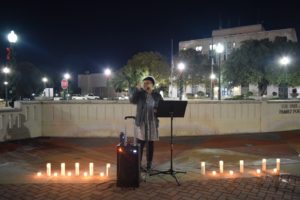 In times when the world seems swirling and chaotic around us, it helps to know we can gather with others to express the spectrum of emotions that such profound events can elicit. When words fail us we can turn to paint, music, dance, photography, sculpture, and any other medium that calls to us. We can work out our questions, knowing full well that there are often no answers. But with defiant resilience, we can make beautiful out of broken, and when we share what we have created, we remind ourselves and each other that we are not alone. Poem by poem, song by song, painting by painting we create the change we so deeply long for.
In times when the world seems swirling and chaotic around us, it helps to know we can gather with others to express the spectrum of emotions that such profound events can elicit. When words fail us we can turn to paint, music, dance, photography, sculpture, and any other medium that calls to us. We can work out our questions, knowing full well that there are often no answers. But with defiant resilience, we can make beautiful out of broken, and when we share what we have created, we remind ourselves and each other that we are not alone. Poem by poem, song by song, painting by painting we create the change we so deeply long for.
Get Involved:
Shop local and support artists living and creating in Central Texas
- Anthem Studio & Gallery
- Creative Waco
- Waco WonderLand
- Central’s Market Artist Fair (December 12th)
- Waco Downtown Farmer’s Market (Artist Markets: December 12th & 19th)
- Blow-Your-Own-Glass-Ornament @ Stanton Studios :: Fridays & Saturdays in December
Volunteer with an arts organization or collective
 Jenuine Poetess is an artist, visionary, and community organizer. In 2010, she founded In the Words of Womyn (ITWOW), an international, grass-roots, written and spoken-word arts project with chapters throughout Los Angeles, CA; Waco, TX; and Lebanon. Jenuine is the founder of Waco Poets Society and co-founder of the Central Texas Artist Collective. She writes, organizes, and creates rooted in the fierce conviction that holding intentional space, access, and opportunity for all people to foster their creative health is a matter of justice and is a vital asset to the sustainable thriving of communities. She currently lives and poems in Central Texas where she enjoys finding new ways to disrupt the homeostasis of her city. You can contact her at: j[email protected].
Jenuine Poetess is an artist, visionary, and community organizer. In 2010, she founded In the Words of Womyn (ITWOW), an international, grass-roots, written and spoken-word arts project with chapters throughout Los Angeles, CA; Waco, TX; and Lebanon. Jenuine is the founder of Waco Poets Society and co-founder of the Central Texas Artist Collective. She writes, organizes, and creates rooted in the fierce conviction that holding intentional space, access, and opportunity for all people to foster their creative health is a matter of justice and is a vital asset to the sustainable thriving of communities. She currently lives and poems in Central Texas where she enjoys finding new ways to disrupt the homeostasis of her city. You can contact her at: j[email protected].
The Act Locally Waco blog publishes posts with a connection to these aspirations for Waco. If you are interested in writing for the Act Locally Waco Blog, please email [email protected] for more information.
By Dillon Meek
There has been a lot of talk lately (at least in my world) about payday and auto title loans and how our community should respond to the presence of this industry in our community (assuming there should be a response at all). This is the first post, in a series of posts, to address the topic of payday lending in Waco, Texas.
Other posts that will follow this one will include discussions on alternatives to payday lending that are available to borrowers, laws regulating payday lending (including the option for a local ordinance), and personal stories from people in our community who have been effected by payday lending.
But first, let’s look at what payday lending is, why it’s a problem and why we as a community need to respond.
Let’s Start at the Beginning: What is a Payday Loan?
Payday and auto title loans are high cost, small-dollar loans. They are offered with little-to-no consideration for a borrower’s ability to repay. Payday loans require proof of employment and access to a bank account via a post-dated check or electronic ACH authorization. The initial term is typically two weeks – until after the next paycheck. Auto title loans are secured by a car title; the amount loaned is based on the value of the car and they have terms of thirty days. They are both marketed on the basis of speed and convenience to people.
So What’s the Problem with Payday Loans?
Most payday loans are predatory. While there are no legal definitions in the United States for predatory lending, an audit report on predatory lending from the office of inspector general of the FDIC broadly defines predatory lending as “imposing unfair and abusive loan terms on borrowers.” Here are some signs that a payday loan is predatory:
- Triple digit interest rate. Payday loans carry very low risk of loss, but payday lenders here in Waco typically charge fees equal to 400% – 500% APR.
- Unlike when a bank issues a loan, predatory lenders do not consider a borrower’s ability to repay. Payday lenders allow (and often encourage) consumers to borrow the maximum allowed, regardless of their credit history, wages, or ability to repay. If the borrower can’t repay the loan, the lender collects multiple renewal fees and makes more money. In other words, the more unsuccessful the borrower is, the more successful the lender is.
- Loan flipping (extensions, rollovers or back to back transactions). Payday lenders earn most of their profits by making multiple loans to cash-strapped borrowers. 90% of the payday industry’s revenue growth comes from making more and larger loans to the same customers. Often times this leads to a cycle of debt.
How is Waco Affected?
- $10.5 million is drained from the Waco economy annually as a result of these institutions.
- There are 36 storefronts in Waco, Texas. None are locally owned.
- On average, 12 cars are repossessed each week by auto title lenders.
- 3 out of 5 payday loans in Waco are to borrowers who pay more in interest than they do in principal.
Source: Texas Appleseed analysis of Texas Office of Consumer Credit Commissioner 2012 and 2013 Credit Access Business Quarterly and Annual Data Reports. Store location data is based on the Office of Consumer Credit Commissioner CAB licensing data for August 2014.
How Do We Respond?
A local Waco group, Citizens for Responsible Lending, is advocating and working hard for (1) the community to develop alternatives to payday loans, (2) education and awareness in the community regarding this issue, and (3) the city council to pass an ordinance regulating payday lending in Waco if the state and federal legislatures will not. Because Texas law does not prohibit predatory lending practices, 26 cities in Texas have passed a uniform ordinance. The other posts in this series will address each of these responses in more detail.
What I know is this: predatory lending is happening in Waco, Texas, and in order for our community to become financially secure, we need to engage a discussion about how we are going to prohibit our citizens from being exploited by this industry. You can participate in this discussion this Tuesday, December 8, at 6 pm at the City of Waco Operations Center at 1415 N 4th St.
 Dillon Meek serves on the Waco City and is general counsel for a local investment company. Prior to that he served as an associate attorney at Haley Olson, PC, where he represented local governments, financial institutions, and energy companies. He is engaged to Lindsey Myers, a Waco ISD school teacher. You can contact him at [email protected].
Dillon Meek serves on the Waco City and is general counsel for a local investment company. Prior to that he served as an associate attorney at Haley Olson, PC, where he represented local governments, financial institutions, and energy companies. He is engaged to Lindsey Myers, a Waco ISD school teacher. You can contact him at [email protected].
The Act Locally Waco blog publishes posts with a connection to these aspirations for Waco. If you are interested in writing for the Act Locally Waco Blog, please email [email protected] for more information.
By Matthew Polk
Last Tuesday, we had the opportunity to have dinner and conversation with community members in East Waco about how they would achieve the Prosper Waco goals in their community. The Prosper Waco community engagement council and the Northeast Riverside Neighborhood Association partnered to bring the Prosper Waco dialogue to East Waco. Some two dozen local residents came out to chew on ideas developed by the Prosper Waco steering committees for achieving the our community’s goals to improve the education, health, and financial security of Wacoans.
There is much to say about our community, both its strengths and challenges. To focus the conversation, members of the Prosper Waco community engagement council guided the conversation with questions focused on three specific initiative efforts:
- Preparing all children to be successful in Kindergarten by engaging parents in their child’s early education and connecting them to resources like high-quality childcare
- Developing a community health worker program to train community members on health issues and empower them to work with their family, friends, and neighbors to better access the healthcare available in our community
- Making new job training opportunities available, including full-time training courses that last just a few weeks and programs specifically designed for youth (16-24 year olds)
There is no “one size fits all” community program—different neighborhoods, even different families, face different challenges and need different things. Whether the programs listed above will work and how they can work best are things that each neighborhood has to decide for itself.
This Wednesday night (December 9) , the community conversation will move to South Waco (Maranatha Church at 2200 Ross Ave.) at 6:00pm. If you live in South Waco, please be part of this event! You do not need to reserve a spot, just come have dinner and be part of the discussion. And if you live in North Waco, join us on Thursday night (December 10) at 6:00pm at Greater New Light Missionary Baptist Church (925 N. 18th St.). At both events, we’ll be focusing on the three topics listed above, but there will be plenty of opportunity to provide thoughts and ideas on other issues that the Prosper Waco initiative is working on.
We know that Wacoans (and especially Act Locally Waco readers!) care about Waco. Even if you can’t attend community meetings, we want to make it as easy as possible for you to stay informed on the Prosper Waco initiative and be part of the conversation about how our community is doing on the most important issues: education, health, and financial security for all members of our community. If you have ideas about what it takes to improve education, health, and financial security in your community, don’t hesitate to reach out. In fact, you can use our new community engagement email address: [email protected]!
Send an email to us at this address and you’ll get a reply either from a Prosper Waco staffer or a member of the Prosper Waco community engagement council—a community member who lives in your neck of the woods. Either way, every comment and idea is important and helps guide where this community initiative goes!
 This Act Locally Waco Blog post was written by Matthew Polk. Matthew is Executive Director of Prosper Waco. Prior to that, he served as Superintendent of Rapoport Academy Public School. He and his wife attended Baylor, and after spending a few years in the northeast, they returned to Waco to raise their family. They have four children, ages 8 to 3 months. You can contact him at [email protected].
This Act Locally Waco Blog post was written by Matthew Polk. Matthew is Executive Director of Prosper Waco. Prior to that, he served as Superintendent of Rapoport Academy Public School. He and his wife attended Baylor, and after spending a few years in the northeast, they returned to Waco to raise their family. They have four children, ages 8 to 3 months. You can contact him at [email protected].
The Act Locally Waco blog publishes posts with a connection to these aspirations for Waco. If you are interested in writing for the Act Locally Waco Blog, please email [email protected] for more information.
By Kaylah Johnson
In just 4 months of employment, I have fallen in love with Goodwill. When most individuals think of Goodwill, they think of retail stores or maybe they find themselves humming Macklemore’s song Thrift Shop. While our retail stores are well known for their bargains, it’s our Mission Services efforts that really give me the warm fuzzies. Specifically, it’s the Careers in Retail program that gives me a sense of fulfillment and allows me to achieve my personal mission of stimulating growth in my community by providing encouragement, guidance, and education to the individuals and organizations that reside within it.
Now here is the textbook description of Careers in Retail…
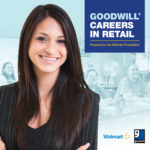 “Careers in Retail (CiR) is a no-cost program that prepares entry-level employees to move up to rewarding, higher-paying jobs and lasting careers in the retail, restaurant, and hospitality industries. This is achieved through remedial, soft skills, and occupational training that equips our clients with the necessary tools to turn their entry-level jobs into mid-level careers. This initiative is funded by the Walmart Foundation and executed by 8 select Goodwill’s throughout the U.S. This initiative is built upon Heart of Texas Goodwill’s 60 years of successful job training programs in our community.”
“Careers in Retail (CiR) is a no-cost program that prepares entry-level employees to move up to rewarding, higher-paying jobs and lasting careers in the retail, restaurant, and hospitality industries. This is achieved through remedial, soft skills, and occupational training that equips our clients with the necessary tools to turn their entry-level jobs into mid-level careers. This initiative is funded by the Walmart Foundation and executed by 8 select Goodwill’s throughout the U.S. This initiative is built upon Heart of Texas Goodwill’s 60 years of successful job training programs in our community.”
Now here is the truth…
Careers in Retail is unique to this community. It’s one of the most job placement intensive initiatives that I’ve encountered in my 15 year stay in Central Texas. The whole idea behind it is to help people see their potential for being successful and prepare them to step into greater roles in the restaurant, retail and hospitality industries. According to the most recent U.S Census, just over 30% of the Waco community lives in poverty. Many of those people are working jobs for $7.25 an hour in the restaurant, retail and hospitality industries – which equals about $15,000 in annual income before taxes. Surprisingly, these wages aren’t just affecting one age range. The chart below shows the age ranges of our current CiR participants:
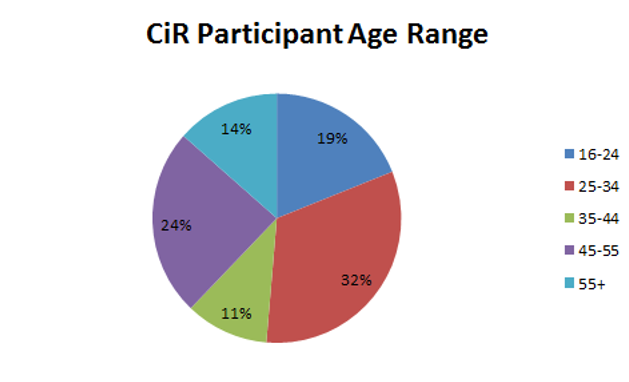 Additionally, our current participants come from a variety of racial and ethnic backgrounds. So what does this mean? In short, it means that ALL of this community needs the Careers in Retail program. There are some great jobs available in retail, restaurant, and hospitality, but not a large pool of qualified applicants. Our focus is to bridge that skills gap and move people into mid-level positions by providing them with the training and skills needed to be successful. Now that we’ve covered the what and the why, let’s talk about the how.
Additionally, our current participants come from a variety of racial and ethnic backgrounds. So what does this mean? In short, it means that ALL of this community needs the Careers in Retail program. There are some great jobs available in retail, restaurant, and hospitality, but not a large pool of qualified applicants. Our focus is to bridge that skills gap and move people into mid-level positions by providing them with the training and skills needed to be successful. Now that we’ve covered the what and the why, let’s talk about the how.
It all begins with an application. CiR applications can be picked up from any of the four Goodwill Learning Centers (Killeen, Belton, Temple, or Waco) or found online on the Heart of Texas Goodwill website. Applications are then reviewed by CiR Specialists. Next we perform interviews and assessments for applicants to ensure that they are a good fit for the program. We look for motivated self-starters with industry background who have an immediate desire to move into a better position in retail, restaurant, or hospitality. Once accepted into the program, participants receive individualized skills training. Maybe they need a refresher using Microsoft Excel or they need some help with their interview skills? Either way, we provide that training to help them improve.
The highlight of this program is the training that we provide through the National Retail Federation (NRF). There are 3 major certifications provided through NRF: (1) Customer Service and Sales, (2) Advanced Customer Service and Sales, and (3) Retail Management. We require all participants to complete the Customer Service Essentials course. This course provides detailed training on the do’s and don’ts of customer service while incorporating curriculum that assists with passing the Customer Service and Sales certification exam through NRF. Passing this course and the certification exam gives people the opportunity to add something new to their resume and develop the exceptional customer service skills that are needed to stand out with employers. The other two courses are optional and are assigned based on specific needs identified for each individual participant.
Once the participant has completed all of the skills training, we get them job ready! In collaboration with our Goodwill Learning Centers, we provide services for resume writing, cover letter writing, interview skills, job search & networking techniques, self-presentation, and much more. We also work with local employers to help place our participants into mid-level positions.
All of the services listed above are provided at no cost to our CiR participants so there is much more to gain than there is to lose. Our goal is to place over 100 people from this community into new careers in retail, restaurant, or hospitality. If you or someone you know may benefit from this program, please feel free to contact me: Kaylah Johnson, Program Manager for Careers in Retail at (254) 495-9415 or [email protected].
 Kaylah Johnson is a business major with the heart of a social worker. She has won two awards for her dedicated volunteer work in Central Texas and continues to volunteer her time to a variety of local causes. She is currently set to graduate with her MBA with a concentration in Management & Leadership from Texas A&M University – Central Texas in May 2016. Her motto is “I don’t know everything but I can learn anything” so in her spare time aside from spending time with family, Kaylah likes to read and watch anything that will broaden her skill set.
Kaylah Johnson is a business major with the heart of a social worker. She has won two awards for her dedicated volunteer work in Central Texas and continues to volunteer her time to a variety of local causes. She is currently set to graduate with her MBA with a concentration in Management & Leadership from Texas A&M University – Central Texas in May 2016. Her motto is “I don’t know everything but I can learn anything” so in her spare time aside from spending time with family, Kaylah likes to read and watch anything that will broaden her skill set.
The Act Locally Waco blog publishes posts with a connection to these aspirations for Waco. If you are interested in writing for the Act Locally Waco Blog, please email [email protected] for more information.
by Courtney Restivo Wollard
The City of Waco is preparing to be designated as a Smoke Free City in January. As an advocate for health, I felt it was time to discuss this ordinance and the positive impact it will have on our city and its residents.
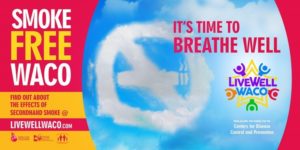 First of all, smoke free laws are not a new concept. In fact, as of July 2015, twenty-six states and 763 municipalities in the U.S. have placed bans on smoking in restaurants and bars as well as non-hospitality workplaces. These laws are being implemented all over the country and all over the world. Ninety-two nations have enacted some sort of 100% smoke free law, sixty-two of those laws include both restaurants and bars. On October 1, 2015, it became illegal to smoke in vehicles with those under the age of 18 in England and Wales. The Texas statewide ban has stalled, but numerous cities in Texas are taking action and enacting their own smoking bans including Robinson, Woodway and soon Waco.
First of all, smoke free laws are not a new concept. In fact, as of July 2015, twenty-six states and 763 municipalities in the U.S. have placed bans on smoking in restaurants and bars as well as non-hospitality workplaces. These laws are being implemented all over the country and all over the world. Ninety-two nations have enacted some sort of 100% smoke free law, sixty-two of those laws include both restaurants and bars. On October 1, 2015, it became illegal to smoke in vehicles with those under the age of 18 in England and Wales. The Texas statewide ban has stalled, but numerous cities in Texas are taking action and enacting their own smoking bans including Robinson, Woodway and soon Waco.
Do you remember when it was legal to smoke on airplanes? I’m a little too young to remember that, but I do notice the ‘No Smoking’ signs on airplanes today and know the history. It has been 25 years since smoking was banned on airplanes and now there is an entire generation that could not even imagine smoking on an airplane. That’s a huge accomplishment for public health! The City of Waco smoke free ordinance will contribute to another generation not knowing what it was like for smoking to be allowed in indoor workplaces, including restaurants and bars along with bingo and pool halls.
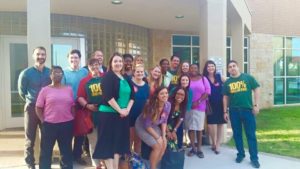 Second, it is a known fact that secondhand smoke causes disease and premature death for nonsmokers. Countless studies published by leading health agencies have affirmed that secondhand smoke is a completely preventable cause of death. According to the 2006 U.S. Surgeon General, there is “no safe level of secondhand smoke exposure and the only way to ensure health protection is a 100% smoke free environment.”
Second, it is a known fact that secondhand smoke causes disease and premature death for nonsmokers. Countless studies published by leading health agencies have affirmed that secondhand smoke is a completely preventable cause of death. According to the 2006 U.S. Surgeon General, there is “no safe level of secondhand smoke exposure and the only way to ensure health protection is a 100% smoke free environment.”
Smoke Free laws are designed to protect the public health and welfare of the community from health hazards such as heart disease, various cancers, stroke, and respiratory infections induced by breathing in secondhand smoke.
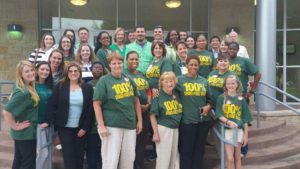 There are several health benefits that we should see with this new smoke free ordinance. The ordinance will reduce exposure to secondhand smoke and produce a drop in ER visits due to heart and asthma related issues. Heart disease is the leading cause of death in the nation for men and women. Smoke free environments have been shown to decrease the rate of heart disease. Smoke free laws move us in the right direction – hopefully soon heart disease will no longer being the number one killer of Americans. These laws will also encourage people to quit smoking and prevent youth from starting to smoke; this will ultimately reduce the number of smoking related deaths.
There are several health benefits that we should see with this new smoke free ordinance. The ordinance will reduce exposure to secondhand smoke and produce a drop in ER visits due to heart and asthma related issues. Heart disease is the leading cause of death in the nation for men and women. Smoke free environments have been shown to decrease the rate of heart disease. Smoke free laws move us in the right direction – hopefully soon heart disease will no longer being the number one killer of Americans. These laws will also encourage people to quit smoking and prevent youth from starting to smoke; this will ultimately reduce the number of smoking related deaths.
Essentially, our community will be healthier, happier and will continue to prosper after this ordinance goes into effect.
I am very excited to soon be living in a designated smoke free city! I applaud the City of Waco for taking this step towards protecting the health of its residents in order to have a prosperous Waco!
 Courtney Restivo Wollard is a lifelong Waco resident who works as Lead Health Services Coordinator at the Waco-McLennan County Public Health District. She serves as Chair for the Live Well Waco/Obesity Working Group of the Prosper Waco Health Committee. She is also an alumnus of the Waco Foundation LeadershipPLENTY Institute. Courtney graduated with her Masters of Public Health from Baylor University and right away began her career as a health advocate. She is married to Kyle. They have a Chihuahua and a Labrador retriever and are in the midst of building their dream home. Courtney hopes to continue to help create a healthier environment for McLennan County residents filled with healthy eating and physical activity opportunities.
Courtney Restivo Wollard is a lifelong Waco resident who works as Lead Health Services Coordinator at the Waco-McLennan County Public Health District. She serves as Chair for the Live Well Waco/Obesity Working Group of the Prosper Waco Health Committee. She is also an alumnus of the Waco Foundation LeadershipPLENTY Institute. Courtney graduated with her Masters of Public Health from Baylor University and right away began her career as a health advocate. She is married to Kyle. They have a Chihuahua and a Labrador retriever and are in the midst of building their dream home. Courtney hopes to continue to help create a healthier environment for McLennan County residents filled with healthy eating and physical activity opportunities.
The Act Locally Waco blog publishes posts with a connection to these aspirations for Waco. If you are interested in writing for the Act Locally Waco Blog, please email [email protected] for more information.
References:
U.S. smoking bans –
World smoking bans –
- http://www.no-smoke.org/pdf/internationalbarsandrestaurants.pdf
- http://www.bbc.com/news/world-11845158
Smoking ban in vehicles in England/Wales –
- https://www.gov.uk/government/publications/new-rules-about-tobacco-e-cigarettes-and-smoking-1-october-2015/new-rules-about-tobacco-e-cigarettes-and-smoking-1-october-2015
- http://www.inquisitr.com/2342320/smoking-in-cars-with-children-illegal-starting-october-1st-2015/
Smoking ban on airplanes –
Benefits –
- http://www.cdc.gov/tobacco/data_statistics/fact_sheets/secondhand_smoke/protection/improve_health/
- http://www.acscan.org/pdf/tobacco/reports/acscan-smoke-free-laws-report.pdf
By Kiera Collins
Y.E.S. (Youth Empowerment Services) is a Medicaid waiver program. The purpose of Y.E.S. is to keep at-risk youth who are in danger of out of home placement or inpatient psychiatric treatment in the home with the family unit. I am a behavior specialist at Klaras Center for Families. As a behavior specialist, I tutor and mentor my assigned clients, many of whom participate in the Y.E.S. program.
The Y.E.S. program is 12 months long. In those 12 months we work on school issues, learning deficits, vital skills, goal setting, seeking natural supports, communication skills, coping mechanisms, safety plans, and many specially designed undertakings that will benefit the family unit as a whole. Our goal is to empower the family and give them a better foundation to build upon.
These goals are accomplished by providing community based services for the child and parent. Some of those services include art therapy, equine therapy, recreational therapy, adaptive aides, community living specialists, and family support specialists.
I have been able to make community contacts with Angie Veracruz from Central Texas Artists Collective (CTAC), Cherie Hudson at The Cutting Edge Salon and Spa, William McKeever at D20 prints, and Brazos Books. Ms. Veracruz provides our clients with bi-weekly art sessions. Ms. Hudson provided four deserving parents with donated services to promote self-care. Mr. McKeever provided wood block t-shirt printing sessions, and Brazos Books offered a discount on the books we purchased. We have also received donated books from Half Price Books and I ran a successful book drive with Usborne books.
We have been able to provide better services, activities, and support to our clients at Klaras Center for Families in part due to the Y.E.S. waiver program and in part due to the community support that we have received. It is important to encourage our clients by showing them that they have a team of people that want them to succeed. In 12 months we can transform a life and give a family hope for the future.
 Kiera Collins, born and raised in New Orleans, La., is a behavior specialist at Klaras Center for Families. She is a lover of words and all things weird. She is a writer, poet, and artist that spends her days thinking creatively and outside the box. Follow her blog: www.lessonsattheranch.wordpress.com .
Kiera Collins, born and raised in New Orleans, La., is a behavior specialist at Klaras Center for Families. She is a lover of words and all things weird. She is a writer, poet, and artist that spends her days thinking creatively and outside the box. Follow her blog: www.lessonsattheranch.wordpress.com .
The Act Locally Waco blog publishes posts with a connection to these aspirations for Waco. If you are interested in writing for the Act Locally Waco Blog, please email [email protected] for more information.
by Ellen Filgo
When my older son finally potty trained at age 3 years and 4 months, it was a relief to not have to change the diapers of my articulate, stubborn little boy who clearly could use the toilet (but just didn’t want to). It also meant that I no longer had two children in diapers. That’s right, our family had two in diapers for more than a year! It was a relief on our budget to save that money. Diapers are expensive. They can cost up to $100 a month per baby, which can stretch even a middle class family’s budget.
Now imagine you are the 1 out of 3 families in the country who struggle to afford diapers. There are 5.8 million babies in the United States aged 3 or younger who live in poor or low-income families. Not having enough diapers can mean that babies are left in soiled diapers longer or that parents re-use diapers that are meant to be single use. This can lead to health risks for the babies, such as rashes or infections. A clean supply of diapers is also required at the vast majority of childcare centers. If parents can’t provide them, they may not be able to enroll their children in early childhood programs, or even be able to enter the workforce themselves. Lack of access to diapers can sometimes hinder a parent in getting or staying employed at the job they need in order to become more financially self-sufficient.
There is no state or federal safety net program that allocates money for diapers. You cannot buy diapers with SNAP (food stamps) or WIC (a federal program that helps provide food for women, infants and children). Many existing social service organizations, focusing on hunger, homelessness, abuse or pregnancy try to provide diapers to the families they serve, but they rely on irregular donations and they are often lacking larger sized diapers for toddlers.
 This is where the Waco Diaper Bank comes in. Our mission is to collect donations of diapers in order and distribute them to those other social service organizations. We will focus on diapers so that they can focus on their main missions. Our main way of collecting diapers will be through diaper drives. These can be organized by the volunteers working with the diaper bank, or by other people – Girl or Boy Scout groups, schools, fraternities or sororities, businesses – anyone can organize a drive! The Waco Diaper Bank will distribute the donations to our partner social service agencies. If individuals want to donate money, we can take that too! We can use it to purchase diapers in bulk, which can be a cheaper way of collecting diapers.
This is where the Waco Diaper Bank comes in. Our mission is to collect donations of diapers in order and distribute them to those other social service organizations. We will focus on diapers so that they can focus on their main missions. Our main way of collecting diapers will be through diaper drives. These can be organized by the volunteers working with the diaper bank, or by other people – Girl or Boy Scout groups, schools, fraternities or sororities, businesses – anyone can organize a drive! The Waco Diaper Bank will distribute the donations to our partner social service agencies. If individuals want to donate money, we can take that too! We can use it to purchase diapers in bulk, which can be a cheaper way of collecting diapers.
To kick things off, the Waco Diaper Bank is hosting a community wide December Diaper Drive from the 1st to the 14th of December. All sorts of churches, organizations and businesses have signed up to be drop-off locations for donated diapers. We’ll take everything – all brands, sizes, packages; we’ll even take loose diapers, opened packages or the leftovers from a “diaper cake!” You can find the drop-off locations and more information about the diaper bank at our website www.wacodiaperbank.org .
About a year ago, when I first heard about what a diaper bank was, I immediately knew that Waco needed a diaper bank, for two reasons – well, actually three! First, because of the high rate of poverty in Waco. There are a lot of little bottoms that need to stay clean, dry and healthy here in town. Secondly, because of the existence of so many great social service organizations that are already doing wonderful things. Collaboration is the watchword here in town and the diaper bank model is inherently a collaborative one. And the third reason was something that I knew about Waco, but hadn’t really FELT until we started our diaper drive promotion – Waco is a town with a great big heart. There may be a lot of need in our community, but there is also a lot of love and a willingness to give and share. And that’s why I believe my hopes for the Waco Diaper Bank will ultimately become a reality.
 Ellen Filgo is a research librarian at Baylor and a Wacoan of 8.5 years. She loves living in Sanger-Heights with her husband, her stepson and her two energetic little boys. She has been known to get sidetracked researching the answer to a random question casually asked in a Facebook post.
Ellen Filgo is a research librarian at Baylor and a Wacoan of 8.5 years. She loves living in Sanger-Heights with her husband, her stepson and her two energetic little boys. She has been known to get sidetracked researching the answer to a random question casually asked in a Facebook post.
The Act Locally Waco blog publishes posts with a connection to these aspirations for Waco. If you are interested in writing for the Act Locally Waco Blog, please email [email protected] for more information.
By Sara Beth Stoltzfus
I came to Waco from Pennsylvania 6 years ago. I came from studying in a small college town after spending eight years in another small college town. I was thrilled Waco had an Olive Garden.
While I wasn’t initially sold on Waco and Texas (arriving in August did not help), Waco eventually grew to be home. I moved from being an Americorp-like volunteer at a local domestic violence shelter to being employed by that shelter. I found a warm church home. I found a boyfriend who would eventually become my husband. And, I found extra-curricular activities to support my activist passions. After leaving Waco for two years to go to Austin for my Masters of Social Work, I returned with some (or a lot) of hesitancy. Where will I eat? What will I do with my time? Am I too weird now, and will I be able to accept and fit into a town with a more conservative mindset? Sure, I still consider these topics. AND I understand that because I am a white, straight, cisgender, Christian, U.S. citizen individual, it’s MUCH easier for me to stay here, exist here and fight here. It’s much easier to be out about who I am. I unfortunately cannot say that for many of my gay and undocumented friends. That is something we need to change.
But I also have a lot of hope for Waco. There are lots of folks committed to #Wacotown. I get sad when my young and single friends look to move elsewhere. I don’t fault them as Waco is more oriented towards “traditional” families and college folks, not single 30 and 40 year olds-not young and single folks who are gay.
And at the same time, I really think that there is a lot of possibility in Waco. If you have an idea, a dream, a vision, you can (with the help of others) do it! Because we are not already Austin or Dallas, you can take part in the development of something new, something needed. This is not to say that we should throw things together haphazardly because no one else is doing it, because “at least we are doing something.” We should be intentional in our work. Because it’s really exciting if you think about it.
Look at Act Locally Waco and this very blog. Ashley Bean Thornton decided to start a website to connect Wacoans to local events and resources in the community and look at it now! Look at the Waco Poetry Society. A solid group of people meet regularly, share their poetry and create with one another. Go Jenuine! What about the Community Race Relations Coalition, InterWaco and Citizens for Responsible Lending, among others? These are some of the very cool grassroots organizations taking root in Waco.
In 2010, two of my friends got together and created a group advocating for the passage of the Dream Act, a piece of legislation that was designed as a pathway to citizenship for undocumented youth who had lived most of their lives in the United States. That group grew and we did some pretty awesome things together. Recently, a friend commented on an article I shared on Facebook about immigrant women who are participating in a hunger strike, protesting their detention and the inhumane conditions of immigrant detention. She said, “want to do something in solidarity with these women?” I said “yes” and tagged a few friends on the post. Recently, we had an event to write letters of support to the detained women. At least 15 people came! Now we are planning additional meetings for the Waco Immigration Alliance (previously the Waco DREAM Act Alliance). How awesome is that?! One comment turned into something more!
I feel like Waco is on the cusp of so much. I hope it won’t all be gentrification and Whole Foods. I’m not looking for cool coffee shops and new boutiques. I’m looking for a continued fight for justice-and grassroots organizations emerging from Facebook conversations. I’m looking for people saying – publicaly — we love you for who you are: gay, straight, trans, Muslim, undocumented, black, a poetry lover, a chess player-whatever. I know I’m only 6 years a Texan and 4 years a Wacoan. I have much to learn about what Waco has been through and what Waco is currently going through. I know there is much more grassroots work that has been done than what is listed in this post and I am definitely the beneficiary of lots of hard work.
But I am committed to staying, learning, fighting and creating. I’m hopeful. #WacoWeDo.
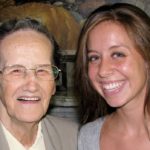 This Act Locally Waco blog post was written by Sara Beth Stoltzfus. Sara Beth is a Social Worker at MCH Family Outreach through the Methodist Children’s Home. Sara Beth is originally from Pennsylvania but has been living in Texas for more than 6 years, 4 of which have been spent in Waco. Sara Beth enjoys spending time with her husband, James, and dog, Bud, as well as with her church community, Hope Fellowship. Sara Beth also enjoys participating in social justice work with other Wacoans.
This Act Locally Waco blog post was written by Sara Beth Stoltzfus. Sara Beth is a Social Worker at MCH Family Outreach through the Methodist Children’s Home. Sara Beth is originally from Pennsylvania but has been living in Texas for more than 6 years, 4 of which have been spent in Waco. Sara Beth enjoys spending time with her husband, James, and dog, Bud, as well as with her church community, Hope Fellowship. Sara Beth also enjoys participating in social justice work with other Wacoans.
The Act Locally Waco blog publishes posts with a connection to these aspirations for Waco. If you are interested in writing for the Act Locally Waco Blog, please email [email protected] for more information.
by Saddiq Granger
“…every ghetto
made me regret my days in the new Jerusalem.
you know it’s hot
don’t forget what you got
looking back…” – Lauryn Hill
I often hear banter about the trappings of my culture with no idea of the heritage or tradition enshrined in them, or the adaptations made through generations of struggle. I hear comments made with no idea of the beauty and complex symbolism inherent in cultures that can trace their roots to the dawn of time, that hold the oldest creation stories. The story of my culture is the story of humanity, it is the main tree that all branches are believed to have sprung from.
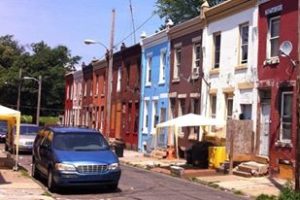 I am from the “Ghetto” — a word borrowed from the Italians in Venice during a time in which they segregated the living quarters of the Jews — 27th & Berks in Philadelphia to be exact. I’ll provide you with pictures but if you don’t believe me look it up.
I am from the “Ghetto” — a word borrowed from the Italians in Venice during a time in which they segregated the living quarters of the Jews — 27th & Berks in Philadelphia to be exact. I’ll provide you with pictures but if you don’t believe me look it up.
Growing up I realized something. The people I was looking at, everyone around me, they were all asleep. No matter how intelligent, they were they were gone as sure as if they had been snoring. So, as a young bull, I engaged in this period where I thought I was the only one who knew what was going on. As an adult, it sometimes seems like I was right.
This lesson was a milestone for me. I learned that consciousness is a choice, and if you have a choice, you have a question.
I was born in the hood; I am ghetto. I know the commandments: look four ways before crossing the street, never let nobody know how much dough you hold, never let them know your next move, never trust nobody. If you don’t know these then you don’t know my side of town; it’s no East Waco. My neighborhood is called the Bad Lands–also known as City Killadelphia. I come from a hood that depends on the drug trade as its main economic support system. These drugs are chef’d in higher income communities where people can afford supplies and have a working knowledge of chemistry. Then they flip’em in large quantities in our hood where they are then sold back to members of upper class (mostly the Caucasian community) and of course local clients (mostly Black or Latino). This serves a few purposes, one of the most important, in my opinion, being that the negative fallout from drug use and selling is not witnessed in places besides “the hood.”
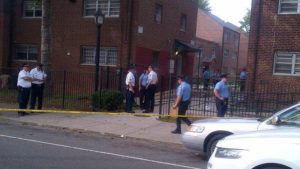 Most of my white peers and I don’t have the same cultural norms to use as a frame of reference. I don’t know very many White people who lived in my community; I saw a sea of Black hopelessness and struggle, people who worked hard and got little for it. As a young child the only correlation I could blame it on was to my skin.
Most of my white peers and I don’t have the same cultural norms to use as a frame of reference. I don’t know very many White people who lived in my community; I saw a sea of Black hopelessness and struggle, people who worked hard and got little for it. As a young child the only correlation I could blame it on was to my skin.
My mom is a hard worker, single parent, straight-A college graduate with a medical degree, who has had more jobs than I can count, most of them what we would call a “hustle” to try and support me and make a better life for herself. I watched and learned from her. My entire life my mother has been a force to be reckoned with it seems. I have never seen her bow to nobody. I learned from these early times in my life to be strong because I had to be, to be self-reliant because there would be no one else. I learned the wealth of achievement and success Africans as a people had contributed to the world. I couldn’t reconcile my feelings of remorse for my condition (skin, ghetto) and this deep love I had for myself and my culture and my family who are all hard working and intelligent. It was a conflict for a long time, until I became conscious of the fact that my skin did NOT equal ghetto. Although I could have told you every fact about Black history, Africa, and the state of our “post-racial” society, I felt this longing to escape, a fleeing from myself and the boxes that (I) had come to mean. It was not about hating being Black, but hating being poor and having some intrinsic sense, even then, that the two were connected.
I began to question what it meant to “Be.”
I am, because…… I am, because, it is? Because it happened? Because I did?
What was shaping me? Was it my external world? My home life? At the time I thought it was a universal consciousness, and now I’m pretty sure it is.
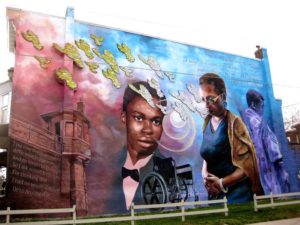 Growing up young gifted and Black in my neighborhood is an experience in isolation. To be and not to be a part of a culture you clearly belong to is an adjustment. It dawns on you slowly that when they look at you, they are not seeing you; that you do not matter. They are seeing your talent, some unspoiled light in a world long gone dark for them. You are their prodigal son, some Black Moses that they silently cry to for release. That dependence — the yearning for release and acceptance — breeds envy and doubt. It causes questions of self-worth, poisons unity. The reality is no one makes it out. No matter how far you run, you can never leave your past.
Growing up young gifted and Black in my neighborhood is an experience in isolation. To be and not to be a part of a culture you clearly belong to is an adjustment. It dawns on you slowly that when they look at you, they are not seeing you; that you do not matter. They are seeing your talent, some unspoiled light in a world long gone dark for them. You are their prodigal son, some Black Moses that they silently cry to for release. That dependence — the yearning for release and acceptance — breeds envy and doubt. It causes questions of self-worth, poisons unity. The reality is no one makes it out. No matter how far you run, you can never leave your past.
Sure you leave the neighborhood and “do better,” but then you catch a few words that put you right back where you came from.
There is this perception across the color line that you pick up on early, it usually sounds something like
“if they would just” or “I don’t see why” or ” why do they have to” and is usually finished by something that should have been left unsaid.
There is a misconception that because we have lived so close for so long, our culture should have assimilated by now. There is a lack of realization that cultures of color — no matter how recent or long ago their immigration — are still different cultures. They are cultures equally as valid as a means of self-expression as White culture, and with drawbacks and failings just like White culture. In my opinion White culture has been enshrined as a story we are fed, so sacred that when presented with new evidence we cling to the old like a leech. I can point to more than a few historical examples. A college history class makes you realize how much of our national his-story is fabricated. But, the dis-value placed on African-American history, art, science, medicine and culture has hurt our communication. It has led to these subjects being regarded as a topic for radicals and rabble rousers.
When’s the last time you read a great Black book?
When your hand goes up in history class you hear, “Why don’t they just learn normal history like everyone else,” or ” not everything is about being Black.”
I chuckle, because it is. I am learning that this skin I’m in means something different to everyone and life presents me with the challenge of proving most of them wrong. I am learning that “normal” history is the result of one people conquering another and selling its own version of events as the only one.
I wrestled with how to present this, about how to make understanding possible, and I felt like understanding would be impossible until we understand the fissure in experience. I felt like no matter how inconvenient, this conversation can’t be put on pause, or halted. I can’t stop being who I am or having my heritage because it would be more convenient to be perceived as something other. Everything I am I owe to the hood, my talent and my skills are all born and bred there. I may have learned the king’s English, the violin, and other skills after, but my childhood in the hood taught me that you are never living for yourself, and all things are temporary. How much of me is still the boy from the projects? Is the difference between me and other young kings opportunity, or is there something special about us few, proud, brave who make it out?
Consciousness comes when you stop looking for a new way to do things and make your own, when you start to question why, why you believe the way you do. Think about the world from your perspective and then shift it slightly until you are viewing yourself from across the room; really give it a shot.
No matter what you do, what you think, or who you know — your actions change you. At the end of the day every experience everyone has ever had has led up to you. Essentially, I am because I exist.
Ase.
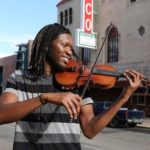 Saddiq Granger is a native Philadelphian, violinist and aspiring community organizer now residing in Waco, Texas.
Saddiq Granger is a native Philadelphian, violinist and aspiring community organizer now residing in Waco, Texas.
The Act Locally Waco blog publishes posts with a connection to these aspirations for Waco. If you are interested in writing for the Act Locally Waco Blog, please email [email protected] for more information.
By Jennifer Alumbaugh, LMFT
“Compassion Fatigue is a state experienced by those helping people or animals in distress; it is an extreme state of tension and preoccupation with the suffering of those being helped to the degree that it can create a secondary traumatic stress for the helper.” ~ Dr. Charles Figley
 We’ve all had our experiences with being stressed out—feeling overwhelmed at the end of a long day or a trying week full of deadlines and intense interactions with others. Usually a good night’s rest or a day or two off are enough to recuperate from stress. When that stress builds up over time without proper attention, it leads to burnout which thankfully can usually be relieved by a longer span of time off—like a week vacation or holiday break. Compassion fatigue rests on the more intense end of the spectrum of the impact of caring for others. Sometimes known as “vicarious” or “secondary trauma,” it is the most extreme manifestation of stress resulting from exposure to those who are suffering. It is important to note that compassion fatigue may present after sustained exposure or after only a single event.
We’ve all had our experiences with being stressed out—feeling overwhelmed at the end of a long day or a trying week full of deadlines and intense interactions with others. Usually a good night’s rest or a day or two off are enough to recuperate from stress. When that stress builds up over time without proper attention, it leads to burnout which thankfully can usually be relieved by a longer span of time off—like a week vacation or holiday break. Compassion fatigue rests on the more intense end of the spectrum of the impact of caring for others. Sometimes known as “vicarious” or “secondary trauma,” it is the most extreme manifestation of stress resulting from exposure to those who are suffering. It is important to note that compassion fatigue may present after sustained exposure or after only a single event.
In my work providing professional development and support to other professionals in the fields of mental health, social work, medicine, foster care, juvenile justice, family interventions, and community social services I often encounter colleagues who are inclined to underestimate the severity of the effects of compassion fatigue.

There is something so uniquely vulnerable about sitting with children and youth who are hurting, who are suffering.
The general stigma is, “that’s not really an actual thing, and even so, I’ve got it under control.” I know. I thought the same thing for years as I worked as a community mental health clinician in Los Angeles County. For five years I saw children and youth who all had histories of physical, sexual, and/or emotional abuse; exposure to community and gang violence; or had experience in the system as a foster child or in a juvenile corrections facility or sometimes all of the above. When I first learned about compassion fatigue—in depth and as an actual issue complete with symptomatology—I thought I was fine. I had it together. I used the phrase “self-care” frequently to qualify activities in which I engaged. I went to supervision. I debriefed with colleagues. I had it all under control.
But I didn’t.
As I moved through that first compassion fatigue training, I began to connect the dots of what I was experiencing. I completed a self-evaluation and found myself to be off the charts with compassion fatigue and burnout and in subzero territory with barely any restorative assets in sight. I was in dire straits.
 When compassion fatigue hits, we feel it across the landscape of our entire being: cognitive, relational, emotional, spiritual, physical, and behavioral. Just like any other ailment of the mind or body, the symptoms begin to interfere with our normal, everyday functioning. We begin to question not only the meaning of our work, but the existential angst spreads to every area of our lives. Compassion fatigue unchecked has the power to unravel us entirely, even rocking our foundation of our core beliefs. It’s serious. It’s real. It deserves our undivided attention.
When compassion fatigue hits, we feel it across the landscape of our entire being: cognitive, relational, emotional, spiritual, physical, and behavioral. Just like any other ailment of the mind or body, the symptoms begin to interfere with our normal, everyday functioning. We begin to question not only the meaning of our work, but the existential angst spreads to every area of our lives. Compassion fatigue unchecked has the power to unravel us entirely, even rocking our foundation of our core beliefs. It’s serious. It’s real. It deserves our undivided attention.
Thankfully, there is hope. Like with so many other challenges in our lives, awareness and education are vital first steps. Understanding the pervasive scope of compassion fatigue, how we are personally at risk or affected, and what practical steps are necessary to recover and maintain wellness and to prevent future instances.
Most importantly, we need to be kind to ourselves, honoring the truth that it is not a result of our own short-comings that we may experience compassion fatigue. In fact, “The expectation that we can be immersed in suffering and loss daily and not be touched by it is as unrealistic as expecting to be able to walk through water and not get wet,” (Remen, 1996).
 After awareness comes action. It is vital that as professionals we intentionally pursue our own wellness. If experiencing compassion fatigue, a season in personal therapy is strongly recommended to address personal and professional circumstances leading to the secondary traumatization. Additionally working through an assets inventory will help to identify specific areas of life that need a boost in self-care practices, people, and pampering. The process is unique for everyone but it is not optional. As Dr. Charles Figley—expert in the field and Director of the Tulane Traumatology Institute–asserts, “It is unethical to not attend to your self-care as a practitioner, because intentional self-care practice prevents harming those we serve.”
After awareness comes action. It is vital that as professionals we intentionally pursue our own wellness. If experiencing compassion fatigue, a season in personal therapy is strongly recommended to address personal and professional circumstances leading to the secondary traumatization. Additionally working through an assets inventory will help to identify specific areas of life that need a boost in self-care practices, people, and pampering. The process is unique for everyone but it is not optional. As Dr. Charles Figley—expert in the field and Director of the Tulane Traumatology Institute–asserts, “It is unethical to not attend to your self-care as a practitioner, because intentional self-care practice prevents harming those we serve.”
Professionally and personally this time of year is often ripe for stress, burnout, and compassion fatigue. While an in-depth training usually spans several hours of teaching, self-evaluations, discussion, and workshopping self-care plans, I couldn’t leave you without a few quick tips for self-care best practices!
Quick Tips for Self-Care Best Practices:
Helpful hint 1: DO spend time with non-traumatized people (this includes family and friends!) who replenish your empathy, joy, and compassion. – Going out with colleagues after work or at lunch is only replenishing if you instate a “No Talking about Work” rule and hold each other accountable!
Helpful hint 2: Set firm boundaries around the time and space you spend with those who deplete your energy, compassion, and nurturing…yes, even/especially when they are your family and friends. It is difficult, not impossible.
Helpful hint 3: If you feel you must spend time with people who deplete you, plan your visit outside of your home, office, or personal space—go to their home, a restaurant, coffee shop, other public venue. This allows you the freedom to leave on your own schedule, avoiding the awkwardness of guests overstaying their welcome in your space.
Helpful hint 4: Set a specific amount of time for your visit and let them know at the beginning that you’ll need to leave by X time. You don’t need to give an explanation for where or why you need to leave, and you don’t need to contrive elaborate fictions. It may sound something like, “Sure let’s grab coffee, I can meet at 1pm and will need to head out by 2pm.”
Self-Care Challenge: Before the stroke of midnight on December 31, 2015, I challenge you to engage in three (3) activities of at least 1 hour each that serve only you. Meaning, you are the only beneficiary of the activity—be it a massage, a walk along a favorite hiking trail, a small gift for yourself, watching the game with friends, getting a sitter for a night out, engaging in a creative/art outlet, or turning off your electronics and going to bed early—whatever resonates with you, do that thing, guilt-free, and practice radical acts of self-love and care.
 Jennifer Alumbaugh, MS is a Licensed Marriage and Family Therapist providing clinical and professional development consultation services at Enrichment Training and Counseling Solutions. She practiced as a mental health clinician throughout Los Angeles County working with children, youth, and their families from 2007-2012. In Central Texas, Jennifer has worked as a Site Coordinator with Communities in Schools of The Heart of Texas at G.W. Carver Middle School; as an independent consultant and professional development trainer; and conference speaker. In 2016 Jennifer created an implemented a therapeutic creative writing program, Brave Young Voices, at Klaras Center for Families and at the Texas Juvenile Justice Department correctional campus at Mart, TX. Jennifer has extensive experience working with adolescent and adult survivors of psychological and spiritual abuse, trauma (sexual violence, childhood trauma, interpersonal violence); and complex PTSD. These, along with grief and loss work are her areas of specialization. She may be reached at: [email protected] or 254-405-2496.
Jennifer Alumbaugh, MS is a Licensed Marriage and Family Therapist providing clinical and professional development consultation services at Enrichment Training and Counseling Solutions. She practiced as a mental health clinician throughout Los Angeles County working with children, youth, and their families from 2007-2012. In Central Texas, Jennifer has worked as a Site Coordinator with Communities in Schools of The Heart of Texas at G.W. Carver Middle School; as an independent consultant and professional development trainer; and conference speaker. In 2016 Jennifer created an implemented a therapeutic creative writing program, Brave Young Voices, at Klaras Center for Families and at the Texas Juvenile Justice Department correctional campus at Mart, TX. Jennifer has extensive experience working with adolescent and adult survivors of psychological and spiritual abuse, trauma (sexual violence, childhood trauma, interpersonal violence); and complex PTSD. These, along with grief and loss work are her areas of specialization. She may be reached at: [email protected] or 254-405-2496.
The Act Locally Waco blog publishes posts with a connection to these aspirations for Waco. If you are interested in writing for the Act Locally Waco Blog, please email [email protected] for more information.

